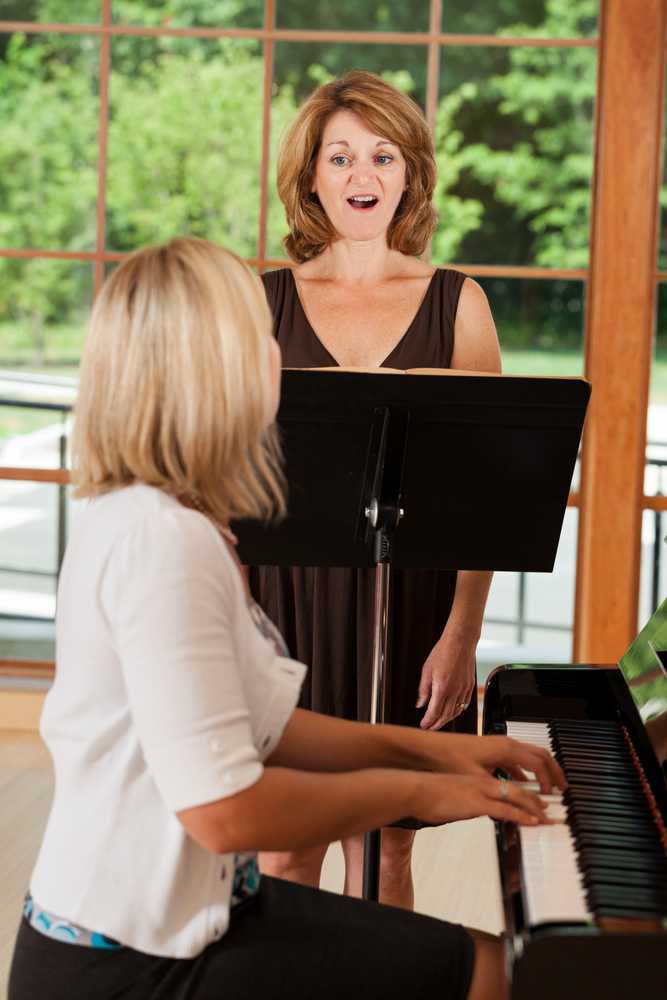I’ve been told (like so many young children who seem to possess some vocal talent) that I learned to sing before I learned to speak. I didn’t grow up with any desire to have classical voice training  or pursue opera as a career. I performed in community musical theatre productions and only wanted to sing the latest pop hits in my spare time. However, at the start of my freshman year of high school and inspired by the self-evaluation that only beginning a new school year can bring, I had a serious sit-down with my parents to discuss the possibility of pursing singing in college (and eventually as a career). They wisely suggested taking classical singing lessons to help create a strong technical foundation so that I could potentially learn to sing anything I wanted, whether it be opera, musical theatre, pop, or jazz.
or pursue opera as a career. I performed in community musical theatre productions and only wanted to sing the latest pop hits in my spare time. However, at the start of my freshman year of high school and inspired by the self-evaluation that only beginning a new school year can bring, I had a serious sit-down with my parents to discuss the possibility of pursing singing in college (and eventually as a career). They wisely suggested taking classical singing lessons to help create a strong technical foundation so that I could potentially learn to sing anything I wanted, whether it be opera, musical theatre, pop, or jazz.
I didn’t go into these new voice lessons with the expectation of becoming a classical singer, and my voice teacher never forced that idea on me. Rather, over the course of a couple of years of consistent lessons, I fell in love with classical music and eventually decided that I sang my best when performing operatic repertoire. I’ve since echoed the importance of classical voice training in my own teaching after having experienced the benefits of my classical technique firsthand. I’ve performed an abundance of non-classical opportunities as a result of my technique, such as singing backup vocals for a hip hop album or taking on a contemporary, “belty” musical theatre role. I was hired for these jobs largely because the professionals who hired me trusted my abilities as a singer due to my classical background.
Classical technique is commonly used among voice teachers as a healthy foundation for any style of singing because it trains the singer to use his or her voice in its full capacity in the healthiest, most sustainable way possible. Below, I’ve detailed how any voice student can open the door to endless possibility by considering classical voice training:
Exceptional Technique
By studying classical voice, the student can expect to build his or her most reliable and malleable foundation for singing. Classical technique particularly develops the following three areas: excellent breath support, a larger vocal range, and vocal flexibility.
Breath Support
Proper breath support is ESSENTIAL for any singer and is often the first point of study in classical voice training. The breath not only fuels the singer’s best possible singing but also allows for vocal longevity so that the singer can continue to sing beautifully and healthfully throughout his or her life. Without good breath support, the voice fatigues quickly, which consequently increases the potential for serious vocal injury. The singer will learn to use breath support to efficiently withstand any length, dynamic level, or intensity of vocal phrase.
Vocal Range
Classical voice training relies heavily on warm-ups and vocalises to not only physically warm up the voice but also challenge the singer to break out of his or her comfort zone. Only once the vocal range and abilities are challenged can the vocal range expand (both higher and lower). In classical lessons, the singer will learn how to access many of those seemingly unreachable notes that often draw aspiring singers to voice lessons in the first place. Part of the reason why classical technique works so well at expanding vocal ranges is because the technique concentrates largely on using and strengthening the head voice, a part of the range that amateur most singers shy away from.
Vocal Flexibility
Flexibility is perhaps the most rewarding result of classical voice training. Instructors who teach classical technique are thorough, causing the student to truly learn the ins and outs of his or her voice. The singer will learn to sing with the lyricism required for long, slow phrases, the agility to sing swift runs, and everything in-between. The student will leave with the confidence to explore other genres and apply their technique to non-classical singing (doing so is strongly encouraged by most teachers). Developing a classical foundation for your singing opens the door to virtually any style of singing.
Music History and Appreciation
Since the vast majority of western classical music was written by composers of the past, delving into classical voice training inevitably becomes a music history lesson. By learning to sing compositions from the past few centuries, the singer better appreciates the evolution of music and its relevance and importance in society today. For example, the student will learn why some styles of classical music are sung lightly and delicately while others require complete fullness of sound. The student will learn the sociopolitical reasons why some composers wrote what they did, when they did, and for whom. The student will be exposed to foreign languages as well as some of the most gorgeous, prominent poetry in existence. Learning classical music requires a certain level of research as the genre covers multiple centuries and follows a steady evolution.
One of the most surprising realizations any singer studying classical voice will experience is how relevant classical music continues to remain in everyday life. It’s nearly impossible to count how frequently classical songs are used in movies, television, commercials, cartoons, shopping locations, classes, weddings, funerals, parties, and so on. Classical music unearths the deepest of human emotions and portrays every human experience. It’s worth any singer’s time to learn how and why the human voice continues to inspire and influence.
While I ultimately decided to pursue a career as an opera singer, I undoubtedly would have found just as much success and fulfillment in other styles of singing due to my classical foundation. I hope that every singer who decides to pursue classical voice training will similarly experience how limitless his or her singing potential can be, and should the student decide against pursuing a musical career, a vocal technique to support his or her passion for music will always remain.







I like that you mentioned that classical voice training can help you increase your vocal range and abilities. I have been trying to improve my range for a while, and I have been thinking about taking lessons. I will have to give them a try and see if they help!